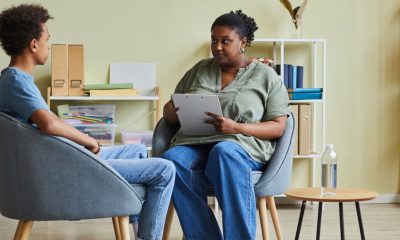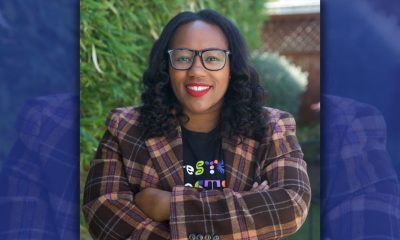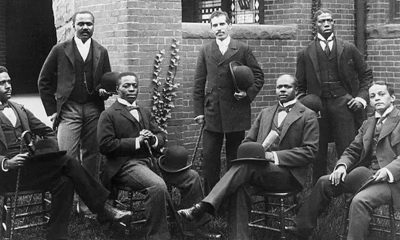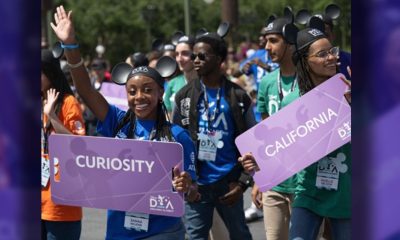National
Blacks Underrepresented in STEM Classes

Wade Henderson, president and CEO of the Leadership Conference on Civil and Human Rights talks about the 2014 Voting Rights Amendment Act at a press conference on Capitol Hill. (Freddie Allen/NNPA)
By Freddie Allen
NNPA Senior Washington Correspondent
WASHINGTON (NNPA) – Many young African Americans will be shut out of the high paying jobs of the future, if they don’t earn a degree in the science, technology, engineering and mathematics (STEM), according to a new report.
The new report by The Leadership Conference on Civil and Human Rights, a coalition of more than 200 advocacy and outreach groups, said that less than 3 percent of Blacks have earned a degree in the natural sciences or engineering fields by the age of 24 and that the STEM labor force is projected to grow by 2.6 million jobs over the next five years. Researchers said that more than half of those jobs will go to people with bachelor’s or master’s degrees.
In a press release about the report Wade Henderson, president and CEO of both the Leadership Conference on Civil and Human Rights and the Leadership Conference Education Fund, said that equal access to a STEM education is crucial to the future of our country and economy, and to the lives of millions of minority and women students.
“We must – all of us – examine what systemic changes are necessary to ensuring that STEM learning is inclusive, engaging, and equally accessible, so that all of our children have the same opportunities to adequately prepare for college and for careers that will allow them to support themselves and their families,” said Henderson.
According the U.S. Bureau of Labor Statistics, STEM workers, specifically in computer and math careers, make more than $80,000 per year. Even workers that graduate with associate’s degrees earn about 10 percent more than those working in non-STEM jobs.
“Yet, right now, all across America, there are nearly 40 million adults – disproportionately people of color and those who grew up in poverty – who do not have a high school diploma or its equivalent,” stated the report. “And they are effectively locked into the lowest rungs of the occupational ladder.”
The majority of poor children don’t know enough words or have enough math skills when they start kindergarten and confronted with less experienced teachers and limited resources are ill-equipped for Algebra, a prerequisite for higher-level math courses, by the time they reach the 8th grade.
Some states failed to provide minority students access to those high-level math and English courses altogether.
“In 2013, there were 11 states where not one Black student took the Advanced Placement (AP) computer science exam, which allows high school students to earn college credit: Alaska, Idaho, Kansas, Maine, Mississippi, Montana, Nebraska, New Mexico, North Dakota, Utah, and Wyoming,” stated the report. “Nearly 20 percent of African-American high school students attend a high school that does not offer any AP courses.”
The report included a number of policy proposals and necessary actions for federal, state, and local lawmakers as well the private sector and philanthropic groups designed to encourage diversity in STEM careers and to raise the awareness of opportunities in STEM in the Black community. Those proposals included provided access to STEM courses as early as elementary school, investing more resources into training teachers, developing technical job programs for an evolving workforce, and asking business and industry leaders to collaborate with colleges to make sure that students are gaining skills to fill vacant STEM jobs.
The report noted that, “The President’s Council of Advisors on Science and Technology (PCAST) warned that 300,000 or so college students graduating each year with bachelor’s and associate’s degrees in STEM fields is one million off the mark
The Department of Education launched The Equity and Excellence Commission, in an effort to eliminate the racial and socioeconomic disparities in education. That group recommended ensuring high-quality early learning programs for low-income students, distributing highly effective teachers equitably, incentivizing the development of racially and socioeconomically diverse schools, and strengthening parent engagement programs.
The Leadership Conference report said that it’s time for the United States to the examine the pressures that squeeze minority children out of the STEM pipeline and to accelerate the reforms that work to close the opportunity and achievement gaps.
“STEM education isn’t merely a new feel-good fad,” stated the report. “It is now – and will continue to be – the backbone of our dynamic and constantly changing world. And it’s critical that we make sure that it’s equally available to every child.”
###
Activism
Oakland Post: Week of December 31, 2025 – January 6, 2026
The printed Weekly Edition of the Oakland Post: Week of – December 31, 2025 – January 6, 2026

To enlarge your view of this issue, use the slider, magnifying glass icon or full page icon in the lower right corner of the browser window.
Activism
2025 in Review: Seven Questions for Assemblymember Lori Wilson — Advocate for Equity, the Environment, and More
Her rise has also included several historic firsts: she is the only Black woman ever appointed to lead the influential Assembly Transportation Committee, and the first freshman legislator elected Chair of the California Legislative Black Caucus. She has also been a vocal advocate for vulnerable communities, becoming the first California legislator to publicly discuss being the parent of a transgender child — an act of visibility that has helped advanced representation at a time when political tensions related to social issues and culture have intensified.

By Edward Henderson, California Black Media
Assemblymember Lori D. Wilson (D-Suisun City) joined the California Legislature in 2022 after making history as Solano County’s first Black female mayor, bringing with her a track record of fiscal discipline, community investment, and inclusive leadership.
She represents the state’s 11th Assembly District, which spans Solano County and portions of Contra Costa and Sacramento Counties.
Her rise has also included several historic firsts: she is the only Black woman ever appointed to lead the influential Assembly Transportation Committee, and the first freshman legislator elected Chair of the California Legislative Black Caucus. She has also been a vocal advocate for vulnerable communities, becoming the first California legislator to publicly discuss being the parent of a transgender child — an act of visibility that has helped advanced representation at a time when political tensions related to social issues and culture have intensified.
California Black Media spoke with Wilson about her successes and disappointments this year and her outlook for 2026.
What stands out as your most important achievement this year?
Getting SB 237 passed in the Assembly. I had the opportunity to co-lead a diverse workgroup of colleagues, spanning a wide range of ideological perspectives on environmental issues.
How did your leadership contribute to improving the lives of Black Californians this year?
The Black Caucus concentrated on the Road to Repair package and prioritized passing a crucial bill that remained incomplete during my time as chair, which establishes a process for identifying descendants of enslaved people for benefit eligibility.
What frustrated you the most this year?
The lack of progress made on getting Prop 4 funds allocated to socially disadvantaged farmers. This delay has real consequences. These farmers have been waiting for essential support that was promised. Watching the process stall, despite the clear need and clear intent of the voters, has been deeply frustrating and reinforces how much work remains to make our systems more responsive and equitable.
What inspired you the most this year?
The resilience of Californians persists despite the unprecedented attacks from the federal government. Watching people stay engaged, hopeful, and determined reminded me why this work matters and why we must continue to protect the rights of every community in our state.
What is one lesson you learned this year that will inform your decision-making next year?
As a legislator, I have the authority to demand answers to my questions — and accept nothing less. That clarity has strengthened my approach to oversight and accountability.
In one word, what is the biggest challenge Black Californians are facing currently?
Affordability and access to quality educational opportunities.
What is the goal you want to achieve most in 2026?
Advance my legislative agenda despite a complex budget environment. The needs across our communities are real, and even in a tight fiscal year, I’m committed to moving forward policies that strengthen safety, expand opportunity, and improve quality of life for the people I represent.
Activism
2025 in Review: Seven Questions for Assemblymember Tina McKinnor, Champion of Reparations, Housing and Workers’ Rights
In 2025, McKinnor pushed forward legislation on renters’ protections, re-entry programs, reparations legislation, and efforts to support Inglewood Unified School District. She spoke with California Black Media about the past year and her work. Here are her responses.

By Joe W. Bowers Jr., California Black Media
Assemblymember Tina McKinnor (D-Inglewood) represents
California’s 61st Assembly District.
As a member of the California Legislative Black Caucus (CLBC),
McKinnor was elected in 2022. She chairs the Los Angeles County Legislative Delegation and leads the Assembly Public Employment and Retirement Committee. McKinnor also served as a civic engagement director, managed political campaigns, and worked as chief of staff for former Assemblymembers Steven Bradford and Autumn Burke.
In 2025, McKinnor pushed forward legislation on renters’ protections, re-entry programs, reparations legislation, and efforts to support Inglewood Unified School District. She spoke with California Black Media about the past year and her work. Here are her responses.
Looking back on 2025, what do you see as your biggest win?
Assembly Bill (AB) 628. If rent is $3,000, people should at least have a stove and a refrigerator. It’s ridiculous that people were renting without basic appliances.
I’m also proud that I was able to secure $8.4 million in the state budget for people coming home from incarceration. That includes the Homecoming Project, the menopause program for incarcerated women, and the Justice Leaders Program.
How did your leadership help make life better for Black Californians this year?
After the Eaton Fire, I pushed to get the same kind of support for affected areas that wealthier regions get after disasters.
I also did a lot of work building political power— establishing the Black Legacy PAC and California for All of Us PAC so we could support Black candidates and educate voters. We also called voters to make sure they understood Prop 50.
People need to understand this: there are only 12 Black legislators in the Capitol. Folks act like we can just walk in and pass reparations, but that’s not how it works.
What frustrated you most this year?
The governor did not have the political will to sign these bills: AB 57 and AB 62. They both passed overwhelmingly in the Assembly and the Senate. We did the work. The only person who didn’t have the political will to sign them was the governor.
The public needs to ask the governor why he didn’t sign the bills. We can’t keep letting people off the hook. He has to answer.
I also introduced AB 51 — the bill to eliminate interest payments on Inglewood Unified School District’s long-standing state loan — held in the Appropriations Committee. That was frustrating,
What inspired you most in 2025?
The civil rights trip to Alabama was life changing. We visited the Legacy Museum and the National Memorial for Peace and Justice. We took members of the Black, Latino, Jewish, and API caucuses with us. It changed all of us.
People aren’t always against us — they just don’t know our history.
What’s one lesson from 2025 that will shape how you approach decisions next year?
The legislative trip to Norway taught me that collaboration matters. Government, labor, and industry sit down together there. They don’t make villains. Everybody doesn’t get everything they want, but they solve problems.
What’s the biggest challenge facing Black Californians in one word?
Inequity. It shows up in housing, wealth, stress – all these things.
What’s the number one goal you want to accomplish in 2026?
Bringing back AB 57 and AB 62, and securing money for the Inglewood Unified loan interest forgiveness.
-

 Activism4 weeks ago
Activism4 weeks agoMayor Lee, City Leaders Announce $334 Million Bond Sale for Affordable Housing, Roads, Park Renovations, Libraries and Senior Centers
-

 Activism4 weeks ago
Activism4 weeks agoOakland School Board Grapples with Potential $100 Million Shortfall Next Year
-

 Activism4 weeks ago
Activism4 weeks ago2025 in Review: Seven Questions for Black Women’s Think Tank Founder Kellie Todd Griffin
-

 Advice4 weeks ago
Advice4 weeks agoCOMMENTARY: If You Don’t Want Your ‘Black Card’ Revoked, Watch What You Bring to Holiday Dinners
-

 Activism4 weeks ago
Activism4 weeks agoAnn Lowe: The Quiet Genius of American Couture
-

 Activism3 weeks ago
Activism3 weeks agoDesmond Gumbs — Visionary Founder, Mentor, and Builder of Opportunity
-

 Advice4 weeks ago
Advice4 weeks agoSupport Your Child’s Mental Health: Medi-Cal Covers Therapy, Medication, and More
-

 Activism4 weeks ago
Activism4 weeks agoBRIDGE Housing President and CEO Ken Lombard Scores Top Honors for Affordable Housing Leadership























































